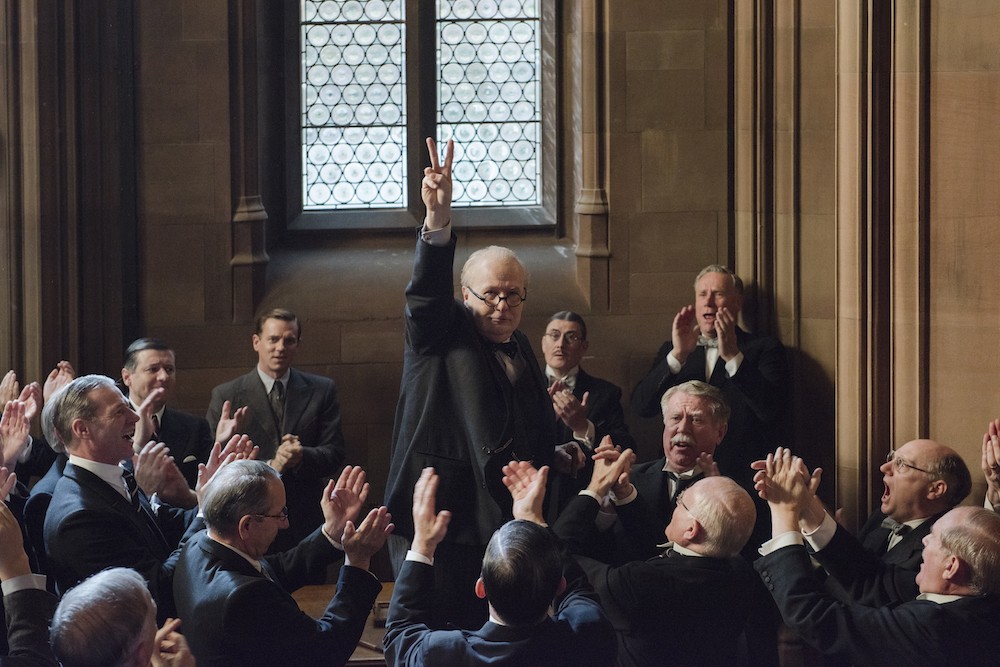Darkest Hour
Darkest Hour, 2017, 4 ¾ stars
Illuminating the darkness
Darkest Hour shines cinematic spotlight on Churchill
From The Orlando Weekly, December 20, 2017
In June 1940, Prime Minister Winston Churchill reflected upon the ongoing Battle of Britain: “Let us therefore brace ourselves to our duties, and so bear ourselves, that if the British Empire and its Commonwealth last for a thousand years, men will still say this was their finest hour.”
But before Britain could get to that finest hour, there had to be a darkest one. That “hour” was actually spread over several weeks in May of that year, and Churchill was its timekeeper.
Wind the clock forward 77 years, and the task has fallen upon Joe Wright to recreate those events. The English director has been helming films for just 12 years but has already managed two masterpieces: Atonement (2007) and Anna Karenina (2012). He made his first major misstep two years ago with the poorly conceived Pan, but he’s now back in top form with Darkest Hour – assisted by Gary Oldman’s career performance as Churchill.
By concentrating on just one month, Wright’s film (written smartly by Anthony McCarten) focuses like a laser on some of the most important events of World War II, including the resignation of Neville Chamberlain, the appointment of Churchill, Churchill’s relationship with King George VI and the fierce debate between those who urged war against Hitler and those in favor of peace negotiations (led by Chamberlain and Viscount Halifax). The evacuation of Dunkirk (Operation Dynamo) is also featured prominently, just as it is in Christopher Nolan’s Dunkirk, the only 2017 drama better than Darkest Hour. But perhaps most significantly, this film also shines a light on Churchill himself and those close to him, including his wife, Clementine (Kristin Scott Thomas), and his personal secretary, Elizabeth Layton (Lily James). Both actresses are excellent – as are Ben Mendelsohn as the King, Ronald Pickup as Chamberlain and Stephen Dillane as Halifax – but it’s Oldman (helped by great makeup) who will finally be carrying home the Oscar for best actor.
Historians will quibble with the slight mischaracterization of the Siege of Calais. (Its impact on the evacuation of Dunkirk was likely not as significant as the film suggests, and its death count was not as high.) In addition, Layton did not join Churchill’s staff – or even meet him – until 1941, though their close relationship is accurately portrayed. And some have even mistakenly labeled the film a conventional biopic that treads little new ground. But those criticisms matter little when you’re emotionally hypnotized by a visual symphony of performance, pacing, editing, cinematography and music that only Wright and perhaps three or four other directors are capable of conducting.
Three months after the events of Darkest Hour, Churchill again “mobilized the English language and sent it into battle” – as Halifax described the prime minister’s rhetorical skills – by uttering the most famous thank-you in political history. Referring to Royal Air Force pilots who had faced down the German Luftwaffe, he said, “Never in the field of human conflict was so much owed by so many to so few.”
But he should have also thanked himself, as it was primarily his own iron will, stubbornness and judgment that saved Western Civilization from fascism. At the risk of metaphorical overreach, perhaps we now owe both Wright and Oldman an enormous debt of gratitude for creating history’s greatest movie about history’s greatest British leader.
Copyright 2017 © Orlando Weekly
